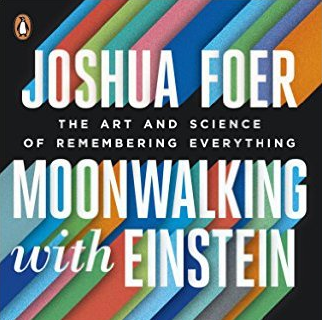Author: Joshua Foer
Rating: [usr=3.5]
The fact that I was bought this book by a family member for my birthday probably owes as much to the title as it does to its content. Nevertheless, it was a fascinating
 insight into the lost world of memory.Joshua Foer was a science writer trying to forge a successful career in journalism. He was commissioned to write an article on competitive memory championships and became hooked into this weird world of recalling list of numbers and the orders of decks of cards.
insight into the lost world of memory.Joshua Foer was a science writer trying to forge a successful career in journalism. He was commissioned to write an article on competitive memory championships and became hooked into this weird world of recalling list of numbers and the orders of decks of cards.
In centuries past – millennia really – memory was all. Before Guttenberg revolutionised the world with the printing press, most of our important knowledge was tucked away inside our heads. But as the storage of our knowledge was outsourced to books, and latterly Wikipedia, we no longer have to remember much – we can just look it up.
Foer’s book partly about the story of how our ancestors invented new ways to circumvent the brain’s limited ability to remember. A famous psychological study says that we can only remember 7 ± 2 “chunks” of information. Give someone a list of twelve things to remember and it quickly passes out of our brains. So our forebears devised ways to make things stick. But today the only place where these once essential techniques get a run out is at competitive memory championships.
The real power of Foer’s story lies with the fact that he decided to learn these ancient techniques and compete in the US memory championships himself with just a year’s worth of training.
The technique he learned was to place the list of objects to be remembered inside a “mind palace”. Imagine a journey or a building that is very familiar to you. Place the objects you want to remember in rooms of that building and form sensual associations that will stick in your memory. The weirder, ruder and more perverse the better. The picture of Foer moonwalking with Einstein was one of the (cleaner) images he used in the competition.
In the book he asks us to remember one particular to-do list and weeks after reading the book I can still recall the list with ease, albeit with some disturbing images of Claudia Schiffer frolicking in a tub of cottage cheese on the front step of my parent’s house.
I won’t give away the ending, but Foer’s book is a captivating journey through the lost art of remembering and his own personal trials and tribulations of becoming a mental athlete (as competitive memory aficionados refer to themselves). His pen portraits of the colourful and eccentric characters he encountered and became friends with on the circuit are both endearing and enjoyable.
The only reason it doesn’t get 4 stars is that the penultimate chapter went off on quite a tangent, causing the book to run out of steam a little before we then hear how Foer got on in the competition.

